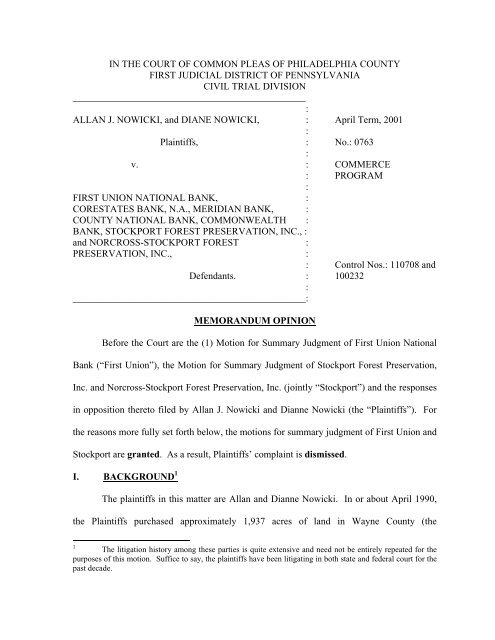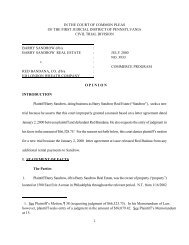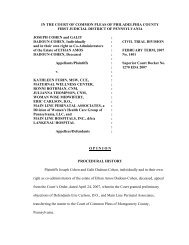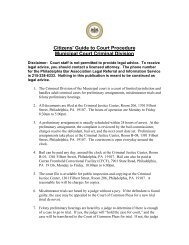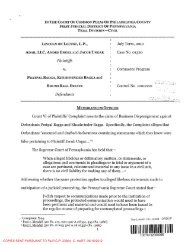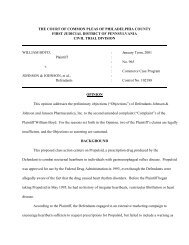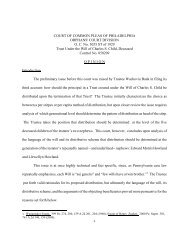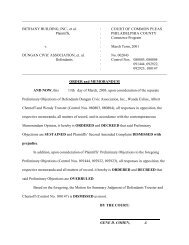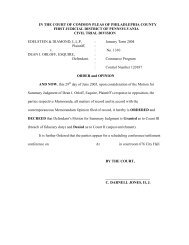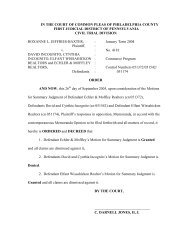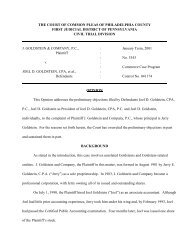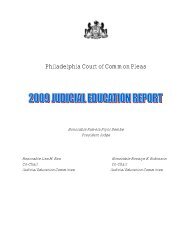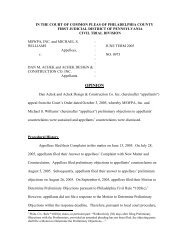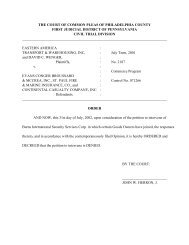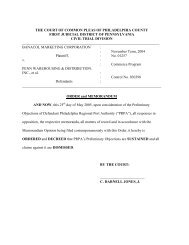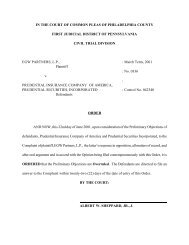ALLAN J. NOWICKI, and DIANE NOWICKI vs FIRST - The ...
ALLAN J. NOWICKI, and DIANE NOWICKI vs FIRST - The ...
ALLAN J. NOWICKI, and DIANE NOWICKI vs FIRST - The ...
Create successful ePaper yourself
Turn your PDF publications into a flip-book with our unique Google optimized e-Paper software.
IN THE COURT OF COMMON PLEAS OF PHILADELPHIA COUNTY<br />
<strong>FIRST</strong> JUDICIAL DISTRICT OF PENNSYLVANIA<br />
CIVIL TRIAL DIVISION<br />
________________________________________________<br />
:<br />
<strong>ALLAN</strong> J. <strong>NOWICKI</strong>, <strong>and</strong> <strong>DIANE</strong> <strong>NOWICKI</strong>, : April Term, 2001<br />
:<br />
Plaintiffs, : No.: 0763<br />
:<br />
v. : COMMERCE<br />
: PROGRAM<br />
:<br />
<strong>FIRST</strong> UNION NATIONAL BANK, :<br />
CORESTATES BANK, N.A., MERIDIAN BANK, :<br />
COUNTY NATIONAL BANK, COMMONWEALTH :<br />
BANK, STOCKPORT FOREST PRESERVATION, INC., :<br />
<strong>and</strong> NORCROSS-STOCKPORT FOREST :<br />
PRESERVATION, INC., :<br />
: Control Nos.: 110708 <strong>and</strong><br />
Defendants. : 100232<br />
:<br />
________________________________________________:<br />
MEMORANDUM OPINION<br />
Before the Court are the (1) Motion for Summary Judgment of First Union National<br />
Bank (“First Union”), the Motion for Summary Judgment of Stockport Forest Preservation,<br />
Inc. <strong>and</strong> Norcross-Stockport Forest Preservation, Inc. (jointly “Stockport”) <strong>and</strong> the responses<br />
in opposition thereto filed by Allan J. Nowicki <strong>and</strong> Dianne Nowicki (the “Plaintiffs”). For<br />
the reasons more fully set forth below, the motions for summary judgment of First Union <strong>and</strong><br />
Stockport are granted. As a result, Plaintiffs’ complaint is dismissed.<br />
I. BACKGROUND 1<br />
<strong>The</strong> plaintiffs in this matter are Allan <strong>and</strong> Dianne Nowicki. In or about April 1990,<br />
the Plaintiffs purchased approximately 1,937 acres of l<strong>and</strong> in Wayne County (the<br />
1 <strong>The</strong> litigation history among these parties is quite extensive <strong>and</strong> need not be entirely repeated for the<br />
purposes of this motion. Suffice to say, the plaintiffs have been litigating in both state <strong>and</strong> federal court for the<br />
past decade.
“Property”). In relation to financing on the Property, the Plaintiffs executed promissory<br />
notes <strong>and</strong> two mortgages in favor of County National Bank. <strong>The</strong>reafter, through a series of<br />
mergers <strong>and</strong> acquisitions, First Union became the holder of the notes <strong>and</strong> mortgages. 2<br />
Plaintiffs admittedly defaulted on the notes <strong>and</strong> First Union commenced foreclosure<br />
proceedings. After several bankruptcies <strong>and</strong> extensive litigation in state <strong>and</strong> federal<br />
bankruptcy court, First Union assigned its interest in the notes <strong>and</strong> mortgages to Stockport.<br />
Stockport successfully foreclosed on the Property <strong>and</strong> purchased it at the Sheriff’s sale.<br />
Plaintiffs believe that the defendants in this matter committed numerous wrongful<br />
acts in their efforts to foreclose on the Property. Based upon these beliefs, the Plaintiffs<br />
commenced this action against First Union by filing a writ of summons on April 6, 2001.<br />
Subsequently, on January 8, 2002, the Plaintiffs filed the civil action complaint (the<br />
“Complaint”) presently at issue. At the time the Complaint was filed, the Plaintiffs added<br />
Stockport as a defendant since Stockport was not a defendant when the writ of summons was<br />
filed. After what appears to be extensive discovery by all parties, both First Union <strong>and</strong><br />
Stockport filed the present motions for summary judgment seeking the dismissal of the<br />
Complaint. <strong>The</strong> Plaintiffs assert that there are numerous factual issues preventing summary<br />
judgment from being entered at this time.<br />
2 Late in 2003, the Plaintiffs filed a motion to amend their complaint in order to: (1) reflect First Union’s<br />
name change to Wachovia National Bank <strong>and</strong> (2) reflect Stockport Forest Preservation, Inc.’s name change to<br />
Stockport Forest Preservation LLC. See Plaintiffs’ Motion to Amend Complaint, 5. <strong>The</strong> Plaintiffs also allege<br />
that Stockport Forest Preservation LLC needed to be added as a defendant based upon facts revealed during<br />
discovery. Id. <strong>The</strong> Court granted the Plaintiffs’ motion on December 11, 2003, permitting them to file an<br />
amended complaint in 20 days from the date of the order. No amended complaint was ever filed.<br />
<strong>The</strong> Court, having reviewed the proposed amended complaint which was attached to the motion to<br />
amend, finds that the amended complaint is essentially identical to the original complaint. <strong>The</strong>refore, this<br />
Court’s decision would not have changed had the proposed amended complaint actually been filed. Moreover,<br />
since the Plaintiffs never raised this issue at oral argument, the Court finds that the Plaintiffs waived any<br />
objection to the entry of summary judgment based upon the original complaint of record.<br />
2
II. DISCUSSION<br />
<strong>The</strong> Plaintiffs complaint contains 13 counts of liability that are asserted against the<br />
defendants. <strong>The</strong> counts are as follows:<br />
I. Breach of Contract.<br />
II. Conversion.<br />
III. Breach of the Covenant of Good Faith <strong>and</strong> Fair Dealing.<br />
IV. Tortious Interference with Contract.<br />
V. Defamation.<br />
VI. Sl<strong>and</strong>er of Title.<br />
VII. Negligence.<br />
VIII. Civil Conspiracy.<br />
IX. Unjust Enrichment.<br />
X. Negligence (mortgagee in possession).<br />
XI. Negligent Misrepresentation.<br />
XII. Fraudulent Misrepresentation.<br />
XIII. Breach of Contract.<br />
In its motion for summary judgment, First Union addresses each of the thirteen counts<br />
alleged against it. Stockport, in its motion, seeks summary judgment on those counts that<br />
they believe pertain only to it. 3 In response to First Union’s motion, the Plaintiffs only make<br />
significant effort to support their breach of contract <strong>and</strong> defamation claims. <strong>The</strong> remaining<br />
counts are treated in a summary manner <strong>and</strong> the Plaintiffs do not respond to any of the legal<br />
<strong>and</strong> factual arguments made by First Union. In response to Stockport’s motion, the Plaintiffs<br />
only address the unjust enrichment <strong>and</strong> defamation claims, remaining silent on the other<br />
counts. After a review of the record, in the light most favorable to the Plaintiffs, the Court<br />
finds that the Plaintiffs have failed to sustain their burden in defending against the motions<br />
for summary judgment of First Union <strong>and</strong> Stockport.<br />
3 Stockport asserts that through discovery the claims against it have been narrowed down to five counts,<br />
specifically, (1) conversion, (2 <strong>and</strong> 3) the defamation counts, (4) conspiracy <strong>and</strong> (5) unjust enrichment. <strong>The</strong><br />
Plaintiffs neither admit nor deny this assertion. Based on its own review, the Court finds that Stockport is<br />
correct in believing that only certain of the thirteen counts are applicable to it.<br />
3
A. First Union Is Entitled to Summary Judgment On All Counts. 4<br />
1. Count I - Breach of Contract.<br />
Plaintiffs allege that First Union breached a global settlement agreement reached<br />
among the parties that would have allowed a reduction in their debt <strong>and</strong> the possible retention<br />
of the Property. <strong>The</strong> Plaintiffs acknowledge that there is no written agreement <strong>and</strong>, instead,<br />
assert that there was an oral contract formed based upon conversations between the<br />
bankruptcy lawyers for the Plaintiffs <strong>and</strong> First Union. In support of their position, the<br />
Plaintiffs essentially rely on the following:<br />
1. A sentence in First Union’s brief that the Plaintiffs believe is an<br />
admission that there was a global settlement agreement; <strong>and</strong>,<br />
2. Deposition testimony of the Plaintiffs’ bankruptcy counsel <strong>and</strong> Mr.<br />
Nowicki.<br />
Turning first to the sentence in First Union’s brief, it is clear that the comment is<br />
taken out of context by the Plaintiffs. <strong>The</strong> sentence is as follows:<br />
4 Regarding Counts II through IV <strong>and</strong> VII through XIII, the Plaintiffs at most devote only three or four<br />
bullet point paragraphs in response to First Union. See Plaintiffs’ Response to First Union’s Motion For<br />
Summary Judgment, pg. 9-13. Plaintiffs do not attempt to refute any of First Union’s factual or legal positions<br />
in these pages <strong>and</strong> the Court notes that the responses regarding these counts appear to be a simple recitation of<br />
the allegations in the Complaint. <strong>The</strong> Court reminds the Plaintiffs that in moving for summary judgment:<br />
Under Rule 1035.2(2), if a defendant is the moving party, he may make the showing<br />
necessary to support the entrance of summary judgment by pointing to materials which<br />
indicate that the plaintiff is unable to satisfy an element of his cause of action. Id.<br />
Correspondingly, the non-moving party must adduce sufficient evidence on an issue essential<br />
to its case <strong>and</strong> on which it bears the burden of proof such that a jury could return a verdict<br />
favorable to the non-moving party.<br />
Rauch v. Mike-Mayer, 783 A.2d 815, 824 (Pa.Super. 2001)(emphasis added). Additionally, “[p]arties seeking<br />
to avoid the entry of summary judgment against them may not rest upon the averments contained in their<br />
pleadings. On the contrary, they are required to show, by depositions, answers to interrogatories, admissions or<br />
affidavits, that there is a genuine issue for trial.” Washington Federal Savings <strong>and</strong> Loan Assoc. v. Stein, 357<br />
Pa.Super. 286, 288, 515 A.2d 980, 981 (1986).<br />
<strong>The</strong> Court realizes that it is not the Plaintiffs’ burden to try their case at this juncture. But Plaintiffs<br />
must at least cite to the record <strong>and</strong>/or proffer evidence in support of the essential elements for each cause of<br />
action they assert in their Complaint. It is not the job of this Court to slog through the record in order to find a<br />
way to legitimize the Plaintiffs’ claims. Nevertheless, this Court has reviewed the record in its entirety <strong>and</strong><br />
finds no evidence to support the Plaintiffs’ claims.<br />
4
<strong>The</strong> evidence shows that First Union gave the Plaintiffs every<br />
opportunity to pay of their debt by, among other things,<br />
agreeing to allow the Plaintiffs to harvest timber on the<br />
Property.<br />
Brief of First Union, pg. 46. This statement read correctly indicates that First Union was<br />
willing to agree to allow the Plaintiffs to harvest timber in order to pay down their debt. By<br />
no means is this sentence an admission regarding the existence of an actual agreement. <strong>The</strong><br />
fact that the Plaintiffs place great emphasis on this single sentence to prove the existence of<br />
an agreement is alarming.<br />
Regarding the Plaintiffs proffered deposition testimony, it is clear that there was no<br />
agreement or contract formed by the parties. Under Pennsylvania law, in order to have a<br />
contract, there must be an agreement on the essential terms of the contract, in particular,<br />
offer, acceptance, consideration <strong>and</strong>/or a mutual meeting of the minds. See Jenkins v.<br />
County of Schuykill, 658 A.2d 380, 383 (Pa.Super. 1995), Liss v. Liss, 2002 WL 576510<br />
(Pa.Com.Pls. 2002).<br />
Plaintiffs present no evidence of <strong>and</strong> agreement on the essential terms of the contract<br />
or a mutual meeting of the minds. Most noteworthy is the fact that there was no agreement<br />
between the parties on the final payment figure First Union would accept from the Plaintiffs.<br />
Plaintiffs freely admit that a final figure was never reached or even offered by First Union.<br />
Instead, the Plaintiffs claim that the pay off number would be whatever was owed <strong>and</strong> that<br />
was enough to form an agreement. Common sense dictates there can be no “global<br />
settlement” when there was not even a final payoff figure agreed to by the parties. 5<br />
5 Even if there was an agreement for the Plaintiffs to pay off the entire debt, there is a question of<br />
consideration. <strong>The</strong> agreement as outlined by the Plaintiffs would have been nothing more than an agreement to<br />
do what the Plaintiffs were legally required to perform already.<br />
5
Most telling is the deposition testimony of Plaintiffs’ own bankruptcy counsel. His<br />
testimony indicates that he believed that Mr. Nowicki would pay whatever was legally owed.<br />
Plaintiffs’ Brief in Response, Exhibit 4, pg. 55. He further qualifies this statement by stating<br />
that if First Union was going to include fees <strong>and</strong> costs, Mr. Nowicki was only going to pay<br />
what would be reasonable under state law. Id. Lastly, he testified that when a person asks<br />
for a pay off figure, there might not necessarily be an agreement with the offered number. Id.<br />
This testimony does not support the Plaintiffs’ position that there was an agreement with<br />
First Union. At most, the Plaintiffs had an agreement in principle regarding the parameters<br />
of a settlement. <strong>The</strong>refore, the Court finds that there was never any agreement as to the most<br />
essential term of the contract; the actual number First Union was going to accept to settle the<br />
matter. 6 As a result, there was no agreement <strong>and</strong> the breach of contract claim must fail.<br />
2. Counts II, IX <strong>and</strong> XIII – Conversion, Unjust Enrichment <strong>and</strong><br />
Breach of Contract.<br />
All three of these counts appear to stem from the Plaintiffs’ allegation that First<br />
Union failed to credit the Plaintiffs’ account with certain funds allegedly received from<br />
harvesting on the Property. In Count II, the Plaintiffs assert that First Union converted<br />
approximately $23,000 in mineral royalties tendered by Tompkins Bluestone Co. when it<br />
retained the funds without crediting the amount against the Plaintiffs’ debt. In Count IX, the<br />
6 As another example of a lack of any meeting of the minds, Plaintiffs assert that the settlement<br />
agreement was to be a global settlement encompassing all claims between the parties, including the Plaintiffs’<br />
tortious interference claim. Plaintiffs’ Brief in Response, pg. 14. Yet, nowhere in the record is there even a<br />
modicum of evidence to support such a conclusion. <strong>The</strong> deposition testimony is devoid of any discussion of a<br />
release of claims.<br />
<strong>The</strong> Plaintiffs portray the global settlement agreement as including their tortious interference claim in<br />
order to avoid the statute of frauds argument of First Union. <strong>The</strong> Plaintiffs assert that because the global<br />
settlement included the tortious interference claim, the statute of frauds is not applicable because it does not<br />
relate solely to an agreement to refrain from foreclosure on l<strong>and</strong>. It is hard to believe that the Plaintiffs suggest<br />
that the settlement espoused by the Plaintiffs was not an agreement to settle a mortgage foreclosure. In fact, the<br />
Plaintiffs allege in 55 of their Complaint the agreement was to settle the underlying foreclosure proceedings.<br />
6
Plaintiffs allege that First Union was unjustly enriched by “accepting assignment of the<br />
mineral rights, without timely crediting them to the principal.” Complaint, 86. In Count<br />
XXII, the Plaintiffs allege that pursuant to a stipulation entered into by the parties; First<br />
Union was required to apply proceeds from an assignment of mineral royalties to the debt.<br />
Complaint, 102, 103.<br />
<strong>The</strong> Court notes that the Plaintiffs fail to provide any further specifics that would<br />
assist the Court in distinguishing these claims. Under Count II, the Plaintiffs allege that<br />
approximately $23,000 was converted by the Plaintiffs. <strong>The</strong> Plaintiffs do not allege any<br />
specified sum in Counts IX <strong>and</strong>/or XIII. Furthermore, the Plaintiffs in Counts IX <strong>and</strong> XIII do<br />
not provide any time frame in which the alleged improper application or retention of royalties<br />
occurred. <strong>The</strong>refore, the Court assumes that the same $23,000 is at issue in all three claims.<br />
In support of these claims, the Plaintiffs do not proffer any documents or testimony<br />
that would evidence First Union acted as alleged. For example, the Plaintiffs do not present<br />
payment histories, checks, funds transfers, or other evidence of royalties generated by the<br />
Property. More importantly, the Plaintiffs do not even attempt to provide a rudimentary loan<br />
balance calculation showing the money allegedly received by First Union, where that money<br />
went <strong>and</strong> what should have been credited. After over a year of discovery, the Court expects<br />
some documentary or testimonial evidence that would indicate this most basic information.<br />
Plaintiffs cannot merely rest upon general <strong>and</strong> conclusory allegations made in their complaint<br />
<strong>and</strong> reiterated in their briefs. 7<br />
7 Plaintiffs also did not respond to First Union’s statute of limitations argument concerning the<br />
conversion claim. First Union alleges that the Plaintiffs were aware of the claim for misapplication of the<br />
$23,000 in December of 1998. First Union cites to the Plaintiffs’ Petition to Stay Execution <strong>and</strong> Petition to<br />
Strike Judgment, filed by the Plaintiffs in the Court of Common Pleas of Wayne County. Specifically, in 30,<br />
the Plaintiffs allege:<br />
7
3. Count III - Breach of Covenant of Good Faith <strong>and</strong> Fair Dealing<br />
In this count, the Plaintiffs allege that First Union failed to honor their obligations<br />
under a “global settlement agreement” <strong>and</strong> that First Union’s “secret” assignment of its<br />
interest to Stockport was done in bad faith. In JHE, Incorporated v. Southeastern<br />
Pennsylvania Transport Authority, the court held “that a breach of the covenant of good faith<br />
is nothing more than a breach of contract claim <strong>and</strong> that separate causes of action cannot be<br />
maintained for each, even in the alternative.” 2002 WL 1018941, *7 (Pa. Com. Pl. 2002).<br />
This claim is merely a repetition of Count I, wherein the Plaintiffs allege a breach of the<br />
global settlement agreement <strong>and</strong>, therefore, this count may be dismissed on this ground<br />
alone. However, the Court has already found that there was no “global settlement” between<br />
the Plaintiffs <strong>and</strong> First Union in the first place. As a result, there can be no claim for a breach<br />
of good faith <strong>and</strong> fair dealing when there is no contract that such an obligation can attach to.<br />
<strong>The</strong>refore, the Plaintiffs’ claim must fail.<br />
3. Count IV - Tortious Interference With Contract.<br />
In this Count, the Plaintiffs allege that First Union tortiously interfered with the<br />
Plaintiffs’ contractual relations by assigning its rights to Stockport. From a review of the<br />
Complaint <strong>and</strong> the Plaintiffs’ briefs, it appears that time frame for this claim is after the<br />
global settlement was allegedly reached between the parties. <strong>The</strong> Plaintiffs are also<br />
On November 2, 1998, Tompkins Bluestone Co. Inc. tendered two checks in the total amount<br />
of $23,032.68 payable to the Bank’s Philadelphia counsel. To date, the Bank has not credited<br />
this payment to Defendants as per joint stipulation.<br />
Exhibit “O”, Motion for Summary Judgment of First Union.<br />
Rather then refute this argument head on, the Plaintiffs bury in their factual background a statement<br />
that they did not discover the conversion claim until after April 6, 1999. Not surprisingly, the Plaintiffs’ writ of<br />
summons commencing this action was filed on April 6, 2001. Based upon the Plaintiffs own pleading in the<br />
Wayne County action, which was personally signed <strong>and</strong> verified by the Plaintiffs, the Court also finds that the<br />
conversion claim is barred by the two year statute of limitations. It is abundantly clear Plaintiffs were aware of<br />
the claim in 1998.<br />
8
presumably talking about the agreement with Stanley Spangenberger, Jr., Logging<br />
Contractor, a copy of which is attached to Mr. Nowicki’s affidavit. 8<br />
Under Pennsylvania law:<br />
<strong>The</strong> tort of inducing breach of contract or refusal to deal is<br />
defined as inducing or otherwise causing a third person not to<br />
perform a contract with another, or not to enter into or continue<br />
a business relation with another, without a privilege to do so.<br />
Restatement, Torts § 766 (1939). Numerous cases in this<br />
Commonwealth are in accord with this definition. See<br />
Restatement, Torts, Pa.Annot. § 766 (Supp.1953).<br />
* * *<br />
Our courts have also indicated that there may be recovery<br />
under this tort theory where a defendant has interfered with<br />
prospective contracts or business relationships of third parties<br />
with a plaintiff. See Neel v. Allegheny County Memorial Park,<br />
391 Pa. 354, 358, 137 A.2d 785, 787 (1958) <strong>and</strong> Locker v.<br />
Hudson Coal Company, 87 Pa. Dist. & Co. 264, 267 (1953).<br />
Glazer v. Ch<strong>and</strong>ler, 414 Pa. 304, 307, 200 A.2d 416, 418 (Pa. 1964).<br />
<strong>The</strong> Plaintiffs present <strong>and</strong>/or cite to no evidence in support of this claim. Again,<br />
although not specifically stated, the act the Plaintiffs rely upon as the predicate for this claim<br />
is the assignment of First Union’s rights to Stockport. First, the Plaintiffs do not argue that<br />
First Union did not have the right under the applicable loan documents to make the<br />
assignment. Second, the Plaintiffs failed to provide any evidence that First Union was not<br />
privileged to act as it did <strong>and</strong> that it intended to interfere with the Plaintiffs’ contractual<br />
relationships. Third, <strong>and</strong> last, if the Plaintiffs are arguing that under the alleged global<br />
settlement agreement First Union forfeited its right to make the assignment; this claim is<br />
barred by Pennsylvania’s gist of the action doctrine <strong>and</strong> the Court’s decision that there was<br />
8 <strong>The</strong> Court is left to make these presumptions because the Complaint <strong>and</strong> briefs fail to identify the<br />
contract allegedly interfered with in connection with this claim in the context of the tortuous interference claim.<br />
9
no global settlement agreement. 9 <strong>The</strong>refore, this claim must fail.<br />
4. Count VII - Negligence<br />
In this count, the Plaintiffs assert First Union was negligent by not acting in a<br />
commercially reasonable manner, thereby causing the Plaintiffs significant damages. <strong>The</strong><br />
Court notes that, under Pennsylvania law, the economic loss doctrine bars the recovery of<br />
economic damages for torts when the only harm is to the product itself <strong>and</strong> not to other<br />
property. See Werwinski v. Ford Motor Company, 286 F.3d 661 (3d. Cir. 2002). <strong>The</strong>refore,<br />
if the only damages from the alleged tort are economic, the tort claims cannot st<strong>and</strong>. Id.<br />
Such is the case here <strong>and</strong>, accordingly, the claim must be dismissed. 10<br />
5. Count VIII - Civil Conspiracy.<br />
In this count, the Plaintiffs allege that First Union <strong>and</strong> Stockport intentionally took<br />
steps to prevent the development of the Property in order to “assure the Plaintiffs would be<br />
unable to consummate the global settlement. . . .” Plaintiffs’ Brief, Page 11. Under<br />
Pennsylvania law, conspiracy is defined as follows:<br />
To prove a civil conspiracy under Pennsylvania law, a plaintiff<br />
must show the following elements: (1) a combination of two or<br />
more persons acting with a common purpose to do an unlawful<br />
act or to do a lawful act by unlawful means or for an unlawful<br />
purpose; (2) an overt act done in pursuance of the common<br />
purpose; <strong>and</strong> (3) actual legal damage. Proof of malice or an<br />
intent to injure is essential to the proof of a conspiracy.<br />
Strickl<strong>and</strong> v. University of Scranton, 700 A.2d 979, 987-88<br />
(Pa.Super.Ct.1997); see also Skipworth v. Lead Indus. Ass'n,<br />
Inc., 547 Pa. 224, 690 A.2d 169, 174 (Pa.1997).<br />
9 Pennsylvania’s gist if the action doctrine bars tort claims that: (1) arise solely from a contract between<br />
the parties; (2) where the duties allegedly breached were created <strong>and</strong> grounded in the contract itself; (3) where<br />
the liability stems from a contract; <strong>and</strong> (4) where the tort essentially duplicates a breach of contract claim or the<br />
success of which is wholly dependent on the terms of the contract. Etoll, Inc. v. Elias/Savion Advertising, Inc.,<br />
811 A.2d 10, 19 (Pa. Super. 2002). According to the Plaintiffs, the breach of the alleged settlement agreement<br />
is the triggering act of the tortious interference claim. <strong>The</strong>refore, the claim would be barred.<br />
10 Once again, the Court notes that the Plaintiffs do not exp<strong>and</strong> upon the general allegations made in their<br />
Complaint by introducing any evidence to show that First Union acted negligently.<br />
10
SNA, Inc. v. Array, 51 F.Supp.2d 554, 560 (E.D.Pa. 1999).<br />
First, the Court finds that there was no global settlement agreement that the<br />
defendants could have conspired against. Second, even if the Court were to find there was a<br />
global settlement agreement, the Plaintiffs fail to adduce any evidence of the elements of<br />
conspiracy. Rather than break down the elements of conspiracy <strong>and</strong> set forth the evidence<br />
supporting each element, the Plaintiffs make nothing more than generalized <strong>and</strong> conclusory<br />
allegations. As a result, the claim must fail.<br />
6. Count X - Negligence (Mortgagee in Possession)<br />
This count is a variation of the negligence count previously asserted. Here the<br />
Plaintiffs assert that First Union was negligent when it was in possession of the Property <strong>and</strong><br />
that First Union failed in their fiduciary duty under the circumstances during this time.<br />
Again, the Plaintiffs rely on conclusory statements <strong>and</strong> generalizations set forth in the<br />
background sections of the Complaint <strong>and</strong> briefs in order to rebut First Union’s position. <strong>The</strong><br />
Court notes that the Plaintiffs do not even establish that First Union was actually a mortgage<br />
in possession of the Property <strong>and</strong>, even assuming such proof was proffered, the Plaintiffs fail<br />
to specify how First Union was negligent in its duties. <strong>The</strong>refore, the claim must fail.<br />
7. Counts XI <strong>and</strong> XII - Negligent Misrepresentation <strong>and</strong> Fraudulent<br />
Misrepresentation.<br />
In these counts, the Plaintiffs allege that First Union made false <strong>and</strong> misleading<br />
representations in order to induce the Plaintiffs into entering the alleged settlement agreement<br />
<strong>and</strong> forgoing certain appeals. Specifically, the Plaintiffs allege that First Union led them to<br />
believe that they would settle the litigation in exchange for accepting logging proceeds all the<br />
while planning to sell the Property to Stockport. Because the Court finds that there was no<br />
11
global settlement agreement, these claims are without its supporting pillar. <strong>The</strong>refore, the<br />
Plaintiffs’ claims must fail.<br />
8. Counts V <strong>and</strong> VI, Defamation <strong>and</strong> Sl<strong>and</strong>er of Title Against First<br />
Union.<br />
Plaintiffs allege that when First Union filed a writ of execution in Bucks County, the<br />
writ acted as a judgment lien on the property of Mrs. Nowicki in Bucks County. <strong>The</strong>refore,<br />
the Plaintiffs argue that the “judgment” should have been satisfied by First Union after the<br />
Sheriff’s sale of the Property. By not satisfying this writ/judgment hybrid, the Plaintiffs<br />
allege that Mrs. Nowicki was defamed. Initially, the Court notes that at the time of the<br />
Sheriff’s sale, First Union had already assigned all of its interest in the loan documents <strong>and</strong><br />
any judgment connected therewith. <strong>The</strong>refore, it would not have been First Union’s<br />
responsibility to mark any judgment satisfied.<br />
<strong>The</strong> Court also notes that the Plaintiffs completely ignore the statute of limitations<br />
argument asserted by Fist Union regarding the defamation counts. Under Pennsylvania law,<br />
under both of these counts, there is a one year statute of limitations. See 42 Pa.C.S.A. §<br />
5523; Pro Golf Manufacturing v. Tribune Review Newspaper Company, 570 Pa. 242, 809<br />
A.2d 243 (2002)(holding sl<strong>and</strong>er of title has the same one year statute of limitations as<br />
sl<strong>and</strong>er). <strong>The</strong> Sheriff’s sale after which the Plaintiffs allege the debt should have been<br />
satisfied occurred in August 1999. <strong>The</strong>refore, for any claim to be timely it would have had to<br />
been brought in August 2000. Plaintiffs did not commence this action by writ of summons<br />
until April 2001. 11<br />
11 No attempt is made by the Plaintiffs to explain the failure to file a claim within the one year after they<br />
assert the writ should have been satisfied. Instead, without any legal or factual support, the Plaintiffs assert that<br />
because the writ is still on the docket, it continues to sl<strong>and</strong>er Mrs. Nowicki. <strong>The</strong> fact remains that the time to<br />
file begins from the date of publication. Under the Plaintiffs’ novel theory, the writ became defamatory when<br />
the judgment should have been marked satisfied.<br />
12
On a more fundamental note, disregarding the statute of limitations argument for a<br />
moment, the Court does not believe that the existence of an unserved <strong>and</strong> returned writ of<br />
execution is the equivalent of a judgment of record in the sense that the Plaintiffs argue. <strong>The</strong><br />
Plaintiffs base their entire argument on a local Bucks County rule of procedure that provides<br />
that if a writ of execution is issued in Bucks County, the writ shall have the same effect as an<br />
indexing of the judgment. Bucks County Local Rule of Procedure 3014(a)(b). <strong>The</strong>refore,<br />
they assert that the writ acts as a judgment lien on all of Mrs. Nowicki’s property in Bucks<br />
County.<br />
First, the writ of execution was directed only at Union National Bank as garnishee.<br />
<strong>The</strong>refore, only the property of Mrs. Nowicki at Union National Bank was to be subject to<br />
the writ. A more grounded interpretation of the Bucks County rule is that when the writ is<br />
actually served on the garnishee, it places a judgment lien on the property in possession of<br />
the garnishee. <strong>The</strong>refore, the writ would act as a judgment lien for the strict purpose of<br />
execution on the property that is described in the writ <strong>and</strong> held by the garnishee in this case.<br />
Second, the writ was never served due to an insufficient address <strong>and</strong> was returned to<br />
First Union’s counsel. Because the operative writ was never served, the Court does not<br />
believe there was any judgment lien placed on any of the property of Mrs. Nowicki.<br />
Plaintiffs proffer no title searches, judgment searches or credit reports that evidences a<br />
judgment lien against Mrs. Nowicki by virtue of the unserved writ of execution. Plaintiffs<br />
also do not present any evidence that a judgment lien is on the judgment index of Bucks<br />
County.<br />
Third, <strong>and</strong> last, the Plaintiffs fail to proffer any evidence of damages suffered as a<br />
result of the alleged defamation <strong>and</strong> sl<strong>and</strong>er of title. Under Pennsylvania law, the Plaintiffs<br />
13
are still required to prove special damages for sl<strong>and</strong>er of title <strong>and</strong> defamation. See Pro Golf,<br />
570 Pa. 242, 248, 809 A.2d 243, 247 (2002)(holding that unless there is sl<strong>and</strong>er per se,<br />
plaintiffs must prove special damages). <strong>The</strong>refore, the Plaintiffs are also without evidence<br />
essential to their defamation claims <strong>and</strong> the claims must fail.<br />
B. Stockport Is Entitled to Summary Judgment On All Counts.<br />
<strong>The</strong> Court initially notes that in their response to Stockport’s motion for summary<br />
judgment, the Plaintiffs focus their argument entirely on two points. First, that their unjust<br />
enrichment claim is not barred by the statute of limitations. Second, Stockport is liable under<br />
the defamation counts as a result of failing to mark the writ/judgment satisfied. <strong>The</strong><br />
Plaintiffs do not even make a cursory effort to defend against summary judgment on the<br />
conversion <strong>and</strong> conspiracy counts. 12<br />
1. Count IX – Unjust Enrichment.<br />
Regarding the unjust enrichment claim, the Plaintiffs make virtually no effort to<br />
establish how Stockport was unjustly enriched. Looking at the Complaint, Count IX states<br />
that the defendants accepted the assignment of mineral rights without properly crediting them<br />
against the balance. 13 First, the Plaintiffs offer absolutely no evidence in support of this<br />
12 Although the Plaintiffs do not appear to admit that the counts asserted against Stockport do not include<br />
counts I, III, IV, VII <strong>and</strong> X through XII, the Court finds that these counts address the alleged global settlement<br />
agreement with First Union. <strong>The</strong>refore, these counts are not applicable to Stockport. However, to the extent<br />
that the Plaintiffs are in any way asserting these counts against Stockport, the claims also fail for the same<br />
reasons they fail against First Union.<br />
13 <strong>The</strong> purchase of the Property by Stockport at Sheriff’s sale was the subject of lengthy litigation in<br />
Wayne County. <strong>The</strong> Plaintiffs repeatedly attempted to stay the sale <strong>and</strong> challenged the sale after it occurred.<br />
Plaintiffs accuse Stockport of committing a fraud upon the courts of Wayne County through its alleged loose<br />
corporate practices when purchasing the Property <strong>and</strong> receiving the assignment from First Union. <strong>The</strong> bottom<br />
line is that the courts of Wayne County, <strong>and</strong> the appellate courts of this state, have consistently upheld<br />
Stockport’s purchase of the Property. If the Plaintiffs believe that Stockport obtained the Property though fraud<br />
<strong>and</strong>/or misrepresentations to the courts of Wayne County, then such allegations should properly be brought in<br />
Wayne County. Plaintiffs’ allegations regarding the circumstances of Stockport’s obtaining the Property is<br />
nothing more than an attempt to collaterally attack the court decisions affirming the sale.<br />
14
claim concerning Stockport. <strong>The</strong> Plaintiffs provide no proof that Stockport received any<br />
royalties or funds earned from the Property after its assignment. <strong>The</strong>refore, it is unclear to<br />
the Court how Stockport was unjustly enriched. In fact, in context of the Complaint, the<br />
Plaintiffs’ unjust enrichment allegations do not make sense as to Stockport. Plaintiffs simply<br />
cannot explain what benefit the Plaintiffs conferred upon Stockport <strong>and</strong> how such a benefit<br />
was unjustly retained. 14 <strong>The</strong>refore, the claim must fail.<br />
2. Counts II, V, IV <strong>and</strong> VIII – Sl<strong>and</strong>er <strong>and</strong> Sl<strong>and</strong>er of Title.<br />
<strong>The</strong> Court finds that these counts fail for the same reasons set forth above in relation<br />
to First Union. 15<br />
III. CONCLUSION<br />
For the reasons more fully set forth above, the motions for summary judgment of<br />
First Union <strong>and</strong> Stockport are granted. As a result, Plaintiffs’ complaint is dismissed.<br />
Dated: 4/15/04<br />
BY THE COURT:<br />
__________________________________<br />
GENE D. COHEN, J.<br />
14 <strong>The</strong> Plaintiffs attempt to tie in Stockport’s alleged misdeeds regarding the assignment from First Union<br />
<strong>and</strong> the alleged misrepresentations in front of the Wayne County courts into their unjust enrichment claim. <strong>The</strong><br />
Court finds these arguments without merit <strong>and</strong> simply an attempt to collaterally attack the Sheriff’s sale of the<br />
Property which was confirmed by the Wayne County courts.<br />
15 <strong>The</strong> Court also notes that Stockport was not joined as a defendant(s) until January, 2002. <strong>The</strong>refore,<br />
the defamation claims are even more untimely as alleged against Stockport.<br />
15
IN THE COURT OF COMMON PLEAS OF PHILADELPHIA COUNTY<br />
<strong>FIRST</strong> JUDICIAL DISTRICT OF PENNSYLVANIA<br />
CIVIL TRIAL DIVISION<br />
________________________________________________<br />
:<br />
<strong>ALLAN</strong> J. <strong>NOWICKI</strong>, <strong>and</strong> <strong>DIANE</strong> <strong>NOWICKI</strong>, : April Term, 2001<br />
:<br />
Plaintiffs, : No.: 0763<br />
:<br />
v. : COMMERCE<br />
: PROGRAM<br />
:<br />
<strong>FIRST</strong> UNION NATIONAL BANK, :<br />
CORESTATES BANK, N.A., MERIDIAN BANK, :<br />
COUNTY NATIONAL BANK, COMMONWEALTH :<br />
BANK, STOCKPORT FOREST PRESERVATION, INC., :<br />
<strong>and</strong> NORCROSS-STOCKPORT FOREST :<br />
PRESERVATION, INC., :<br />
: Control Nos.: 110708 <strong>and</strong><br />
Defendants. : 100232<br />
:<br />
________________________________________________:<br />
ORDER<br />
AND NOW, this ____ day of April 2004, upon consideration of the Motion for<br />
Summary Judgment of First Union National Bank (“First Union”), the Motion for Summary<br />
Judgment of Stockport Forest Preservation, Inc. <strong>and</strong> Norcross-Stockport Forest Preservation,<br />
Inc. (jointly “Stockport”), the responses in opposition to both motions filed by Allan J.<br />
Nowicki <strong>and</strong> Dianne Nowicki (the “Plaintiffs”), the parties respective memor<strong>and</strong>a, all<br />
matters of record <strong>and</strong> after oral argument, it is hereby<br />
ORDERED <strong>and</strong> DECREED that the motions for summary judgment of First Union<br />
<strong>and</strong> Stockport are GRANTED in their entirety, it is further<br />
ORDERED <strong>and</strong> DECREED that Counts one through thirteen of the Plaintiffs’<br />
complaint are DISMISSED, it is further
entirety.<br />
ORDERED <strong>and</strong> DECREED that the Plaintiffs’ complaint is DISMISSED in its<br />
BY THE COURT:<br />
__________________________________<br />
GENE D. COHEN, J.<br />
17


